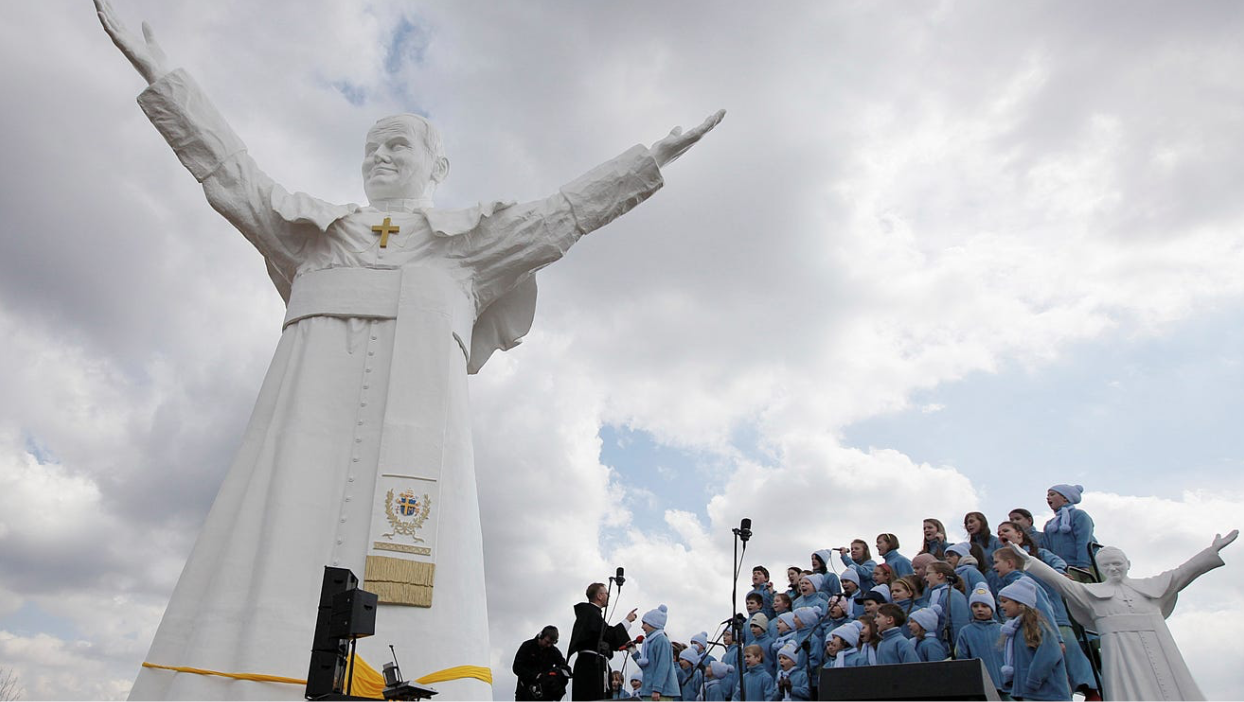In March of this year, a documentary came out that presented new evidence to support the claims that former Pope John Paul II was aware of sexual abuse happening within the Catholic Church of Poland during his time as archbishop and chose to cover it up. The specific allegations claim that the late pope knew that three priests under his dominion were accused of child abuse, and he decided to transfer them instead of taking punitive action. The documentary has sparked intense controversy within the country and outrage amongst Catholic citizens, with many taking to the streets in support of the late pope and his legacy in Poland. Ultimately, the controversy and the ripples it has sent through Polish society speak to a country where politicians marshall religion to their favor—but not without resistance.
Catholicism in Poland
For decades, former Pope John Paul II has been revered in his home country as one of the most, if not the most, important people in Polish history. Born Karol Wojtyła in Wadowice, Poland, he embraced ideas of freedom, interreligious communication, and human rights as pontiff and gained renown as pope by Polish citizens and the rest of the world alike. Not only was he the first non-Italian pope in over 400 years, but he was also elected as pope during the Cold War, when Poland was behind the Iron Curtain. In 2014, he was canonized, solidifying his importance to Catholics around the globe.
At home, he helped to spark the Solidarity movement and the demise of communism in Poland. In June of 1979, John Paul II went back to Poland for the first time after being elected as pope and gave a speech that stressed the importance of freedom and its linkage with the Catholic faith that helped to propel the anti-communist movement.
In reaction to the recent documentary, the Law and Justice party (PiS), the ruling party in Poland, passed a resolution through the Sejm that defended the Polish icon, stating:
“The Sejm … strongly condemns the shameful media campaign, based largely on the materials of the Communist apparatus of violence, whose object the Great Pope–Saint John Paul II, the greatest Pole in history … We will not allow the image of a man whom the whole free world recognizes as a pillar of victory over the Evil Empire to be destroyed.”
PiS has been eroding democracy and the rule of law in Poland since its rise to power in 2015, tearing apart the judiciary, gaining control over independent media outlets, and adopting a platform that stresses nationalism, family values, and Catholicism and attacks immigration and the LGBT+ community. Beyond their efforts to dismantle democracy, they have also aligned themselves closely with the Catholic Church and traditional values. Catholicism has long been deeply entrenched in Polish society, even throughout the communist period where the church would provide support to families struggling through hardship and become an important player in the fall of communism and the transition to democracy. Unsurprisingly, the Catholic Church and the PiS have struck an alliance with each other based on traditional values and anti-communist sentiment.
An alliance with the Catholic Church matches the party’s stance on the family, LGBT+ rights, and more. Since coming to power, PiS has maintained a large voter base amongst older Poles, mostly living in rural areas that tend to be more Catholic. To continue to satisfy these voters, the PiS has spearheaded multiple policy initiatives in line with these values. One of the most successful of their policies has been Family 500+, a program that distributes a monthly allowance of around $125 per child to low-income families, no strings attached, which has effectively incentivized a focus on childrearing. In addition to this, the PiS has also imposed very strict policies on abortion and harshly criticized the LGBT+ community.
This alliance has started to cause a rift between different factions of Polish citizens as younger generations move further away from religion and more traditional values held by generally older members of society. In the past twenty or so years, Polish citizens have moved further away from the church, in part because of the increasing amount of information that has surfaced about abuse in the Catholic Church.
Elections on the Horizon
Elections are slated for October 15th, one day before Pope John Paul II Day in Poland, and the PiS is not in as good of a position as it once was. The center-right Civic Platform party led by the former President of the European Council, Donald Tusk, has been gaining on the PiS in the polls and could have a serious chance of emerging from these elections victorious.
Feeling the pressure of the opposition, PiS has been playing dirty when it comes to election preparation. Using their influence and control over the state, they have made moves like increasing the number of polling stations in smaller towns and villages and providing free transport for the elderly to polling locations, both of which directly target their Catholic voter base. Their bending of the rules goes beyond polling stations—PiS has also used an investigation on Russian election interference to eject multiple public officials from their positions, dodged rules about campaign finance, and planned to propose a set of four referendums during the 2023 election cycle that pose charged questions, which is almost guaranteed to interfere with the execution of a fair election.
To add on, a far-right party called Confederation has been polling close to 15%, as opposed to the 7% of the vote that they won in 2019. The party has expressed anti-EU and anti-immigration sentiments as well as harsh attitudes towards the LGBT+ community and climate change. While it is unclear whether Confederation would join with the PiS in a coalition, it is evident that the party could create another obstacle for both main parties in securing a majority.
Hope for Change
PiS’s steadfast commitment to Catholicism, shown in part through their reaction to the controversy, reflects not only their emphasis on traditional values as well as their determination to remain in power at a time when younger generations are moving away from religion. Despite the PiS’s position, there is still hope that Tusk and his party will emerge victorious. The opposition party has stressed that the policies and decisions of the PiS have contributed to democratic erosion in the country as well as the targeting of minority groups. On Sunday, October 1st, Civic Platform led a massive protest in the capital city of Warsaw, drawing between 500,000 and 1,000,000 attendees with the hopes of increasing momentum and voter turnout. Even if the PiS emerges victorious once again, it is clear that there is a growing push for change in Poland.
Featured Image Source: USA Today






Comments are closed.